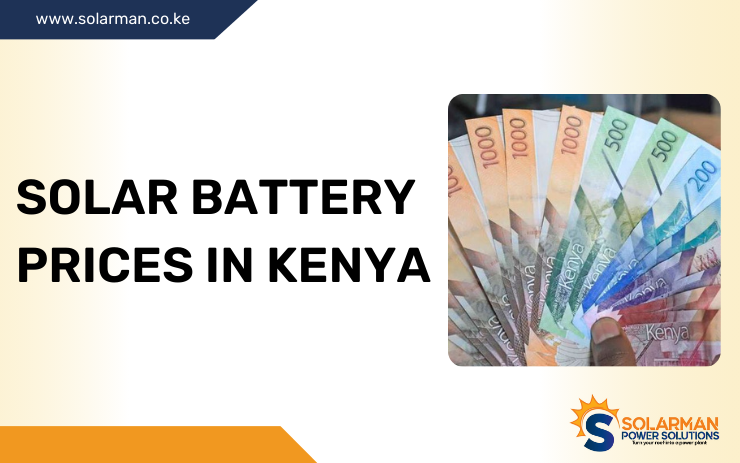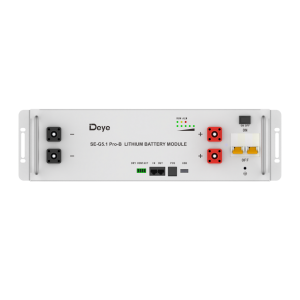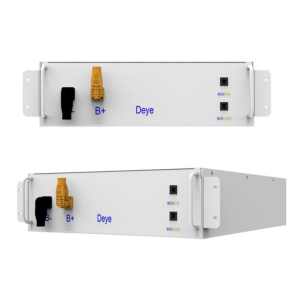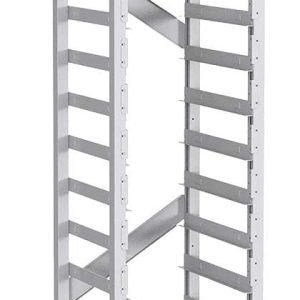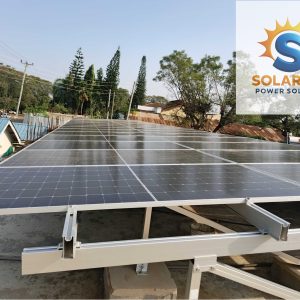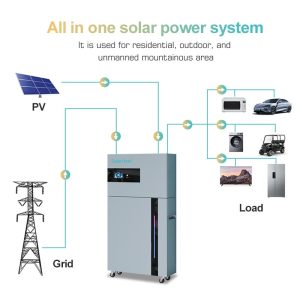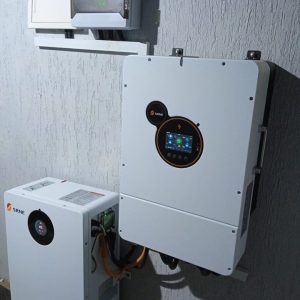Solar battery prices in Kenya vary based on different factors. There are two main categories of batteries; Lead-Acid Solar Batteries and Lithium-Ion Batteries. Lead-Acid Solar Batteries range from Ksh 15,000 to Ksh 70,000. Lithium-Ion Solar Batteries range from Ksh 70,000 to Ksh 300,000.
As Kenya continues to embrace solar energy, more homeowners and businesses are turning to solar batteries to store power for future use.
Smaller solar batteries suitable for residential use typically range from Ksh 20,000 to Ksh 80,000. Larger industrial-sized batteries can cost upwards of Ksh 200,000, depending on the brand and capacity.
But how much does a solar battery cost in Kenya, and what factors influence its price? This guide will walk you through the essentials of solar battery prices, what to consider when buying, and how to choose the best solar battery for your needs.
At Solarman, we offer a range of solar products and services, from solar panels to solar batteries and installations—ensuring you get the best value for your money.
Table of Contents
What Are Solar Batteries?
Solar batteries are essential components of a solar energy system.
They store the energy generated by solar panels during the day so it can be used when the sun isn’t shining—like at night or during cloudy days.
There are several types of solar batteries, including lead-acid, lithium-ion, and flow batteries, each with different price points and features.
Average Solar Battery Prices in Kenya
Solar battery prices in Kenya vary based on different factors.
- Lead-acid Batteries – These are the traditional and most affordable option but come with shorter lifespans and require more maintenance. Lead-acid Batteries range from Ksh 15,000 to Ksh 70,000.
- Advantages: Affordable and widely available.
- Disadvantages: Shorter life, regular maintenance required.
- Lithium-ion Batteries – The most popular option due to their high efficiency and long life. Although more expensive, they offer better long-term value. Lithium-ion Batteries range from Ksh 70,000 to Ksh 300,000.
- Advantages: Longer life, low maintenance, and high efficiency.
- Disadvantages: Higher upfront cost.
- Gel Batteries – A type of lead-acid battery that doesn’t require much maintenance, making them a middle ground between lead-acid and lithium-ion options. Gel Batteries range from Ksh 15,000 to Ksh 70,000
- Advantages: Low maintenance, good for extreme temperatures.
- Disadvantages: More expensive than standard lead-acid batteries.
Smaller solar batteries suitable for residential use typically range from Ksh 20,000 to Ksh 80,000. Larger industrial-sized batteries can cost upwards of Ksh 200,000, depending on the brand and capacity.
- Solar Battery
Deye 5.12 kWh Lithium Ion Battery
KSh 150,000Original price was: KSh 150,000.KSh 125,000Current price is: KSh 125,000. Add to cart - Solar Battery
Deye BOS-G 5.12Kwh H/V Solar Battery System
KSh 210,000Original price was: KSh 210,000.KSh 129,600Current price is: KSh 129,600. Add to cart - Solar Battery
DeYe HV Battery Rack
KSh 100,000Original price was: KSh 100,000.KSh 85,000Current price is: KSh 85,000. Add to cart - Lithium Battery
Deye-BMU-Battery High Voltage Control Box for BOS-G
KSh 148,000Original price was: KSh 148,000.KSh 138,000Current price is: KSh 138,000. Add to cart
Why Invest in Solar Batteries?
Factors Affecting Solar Battery Prices in Kenya
1. Capacity and Size
The capacity of a solar battery refers to the total amount of energy it can store, typically measured in kilowatt-hours (kWh).
In simpler terms, it’s like the size of a fuel tank in a car—the larger the tank (or battery), the more energy it can hold.
For solar systems, this is crucial because it determines how long you can rely on stored energy when your solar panels aren’t producing power, such as during the night or cloudy days.
In Kenya, battery capacity needs to be carefully matched to your energy consumption.
For example, a household with basic appliances (lighting, a TV, and small electronics) might need a smaller-capacity battery than an industrial setup with heavy machinery or large office buildings.
Bigger capacity solar batteries are ideal for businesses or homes with high energy demands but, of course, they come with a higher price tag.
So, the general rule is: the larger the battery’s storage capacity, the more expensive it will be.
However, investing in the right capacity is key to ensuring that you have enough backup power without overpaying for excess storage you don’t need.
Before purchasing a solar battery, it’s recommended that you calculate your daily energy usage in kilowatt-hours (kWh) and consult with a solar expert to ensure you’re buying a battery that meets your household or business needs without overspending.
2. Battery Technology
When it comes to solar battery technology, two major types dominate the market in Kenya: lithium-ion and lead-acid batteries.
Each has its own set of advantages and disadvantages, and the technology you choose can have a significant impact on both the price and the performance of your solar system.
Lithium-ion batteries are the premium choice, known for their longer lifespan, high efficiency, and lower maintenance needs. They can last up to 10–15 years, making them a solid investment if you’re thinking long-term. They also have a higher energy density, meaning they can store more energy in a smaller space, which is especially useful if space is limited. However, these advantages come at a price—lithium-ion batteries are more expensive upfront, but their longevity and efficiency often make them worth the investment over time.
Lead-acid batteries, on the other hand, are a more budget-friendly option. They’ve been around for decades and are widely available in Kenya. They are cheaper than lithium-ion batteries, which makes them attractive for those with smaller budgets. However, lead-acid batteries require regular maintenance (like checking water levels and ensuring proper charging) and tend to have a shorter lifespan, typically lasting between 3–5 years. These batteries are better suited for homes or businesses with smaller energy requirements or those that don’t mind a bit of maintenance work.
Ultimately, the choice between lithium-ion and lead-acid comes down to balancing upfront costs with long-term value. While lithium-ion may cost more initially, they’ll save you money in the long run by lasting longer and requiring less upkeep.
3. Brand and Manufacturer Reputation
In the solar battery market, brand reputation plays a crucial role in determining the price and quality of the product.
Well-known international brands like Jinko, Victron, and LG Chem are highly regarded for their cutting-edge technology, durability, and long warranties.
These companies often lead the way in innovation, offering high-quality solar batteries that promise both performance and longevity.
However, these premium products come with premium price tags, reflecting their superior build quality and advanced features.
On the other hand, local brands in Kenya can offer more affordable alternatives.
While they may not have the same global recognition as Tesla or LG, local manufacturers and brands can still deliver decent quality, especially for basic solar setups.
Choosing a local brand might save you money upfront, but it’s important to be cautious about the performance and lifespan of these products.
Some local batteries may not match the efficiency, lifespan, or overall quality of their international counterparts.
Best Solar Battery Brands in Kenya
Some of the top solar battery brands in Kenya include:
- DeYe: Known for their high-quality lithium-ion batteries.
- Eastman: Offers a range of affordable lead-acid batteries.
- Tesla Powerwall: A premium solution for high-energy demands.
At Solarman, we stock a wide variety of these trusted brands, ensuring that you have access to reliable, high-performance batteries for your home or business.
Factors To Consider When Choosing a Solar Battery
1. Battery Life
One of the most critical factors when selecting a solar battery is its lifespan.
The battery life determines how long the battery will continue to store and supply energy efficiently before it starts to degrade.
Solar batteries are a long-term investment, so it’s essential to choose one that will last for many years.
Most solar batteries have a lifespan measured in cycles (how many times the battery can be charged and discharged before its capacity significantly decreases).
- Lithium-ion batteries, for example, tend to have a longer lifespan—often lasting up to 10-15 years or thousands of cycles before showing signs of wear.
- Lead-acid batteries, while more affordable, typically have a shorter lifespan of around 3-5 years or fewer cycles, which means you’ll likely need to replace them sooner.
A longer battery life means you get more years of reliable performance from your solar system, maximizing your return on investment.
Even though longer-lasting batteries, like lithium-ion, are more expensive upfront, their durability and reduced need for replacement or maintenance make them a smart choice for long-term energy solutions.
2. Warranty
The warranty that comes with a solar battery is another crucial factor to consider.
A strong warranty acts as a safety net, protecting your investment in case the battery fails prematurely or doesn’t perform as expected.
Typically, solar batteries come with warranties that last anywhere from 5 to 10 years, but higher-end products can offer warranties up to 15 years.
A good warranty should cover key aspects, including:
- Battery capacity retention: This ensures that your battery will retain a certain percentage of its original capacity over time. For example, a warranty might guarantee that the battery will still hold 70-80% of its initial capacity after 10 years of use.
- Product defects and performance issues: This ensures that if your battery malfunctions due to a manufacturing defect or fails to perform as promised, it will either be repaired or replaced at no additional cost to you.
When shopping for solar batteries, it’s wise to go for products that offer long warranties, especially if you’re investing in higher-end technology.
A longer warranty not only gives you peace of mind but also serves as an indicator of the manufacturer’s confidence in their product.
Batteries with robust warranties are generally better constructed and more reliable over the long haul, protecting you from unexpected replacement costs.
3. Price
Price is, of course, a major consideration when purchasing a solar battery.
While it can be tempting to go for the cheapest option, it’s essential to strike a balance between cost and performance.
The price of solar batteries in Kenya can vary significantly based on factors like capacity, technology, brand, and features.
- Low-cost options, such as lead-acid batteries, are appealing if you’re on a budget. However, they often come with trade-offs, like shorter lifespans and higher maintenance requirements.
- Higher-end options, like lithium-ion batteries, may have a higher initial cost but offer better efficiency, longer life, and low maintenance, making them a better value over time.
When evaluating the price of a solar battery, think about your energy needs and how you plan to use the battery.
Do you need a battery with a large capacity to power your entire home or business, or are you just looking for a backup during power outages?
Also, consider how long you plan to use the system. If you’re in it for the long haul, spending more on a durable, high-quality battery is worth it, as you’ll get many more years of use.
Avoid paying extra for features you don’t need. For example, some batteries come with advanced features like smart energy management systems that let you monitor and control energy usage via an app.
While these can be helpful, they may not be necessary for every user, especially if your energy needs are straightforward.
Stick to the essentials that align with your goals, ensuring that the battery’s price fits within your budget while still delivering the reliability and capacity you need.
By considering these factors—battery life, warranty, and price—you can confidently choose the best solar battery for your home or business in Kenya, ensuring long-term value and dependable performance from your solar energy system.
Why Solar Installation is Crucial for Performance
A well-installed solar system can make or break the efficiency of your solar battery. Poor installation may lead to energy losses or even system damage.
That’s why it’s essential to work with professionals like Solarman, who specialize in solar installations, ensuring everything works seamlessly.
Solar Battery Maintenance Tips
To get the most out of your solar battery, regular maintenance is key.
Clean the battery terminals, ensure proper ventilation, and avoid overcharging or deep discharging the battery to extend its life.
Solar Battery Storage for Homes vs. Industries
- For Homes: Smaller capacities are sufficient, usually between 5-10 kWh.
- For Industries: Larger capacities upwards of 20 kWh are recommended for bigger energy needs.
Solarman caters to both residential and industrial clients, offering customized solutions to meet your specific requirements.
Advantages of Working with Solarman
At Solarman, we not only offer the best solar products but also professional consultation and installation services.
Our team of experts ensures that you get the right products for your needs, along with seamless installation and after-sales support.
Solar Battery Myths and Facts
- Myth: Solar batteries are too expensive for the average home.
- Fact: While initial costs may seem high, the long-term savings make them a worthy investment.
Future of Solar Energy in Kenya
As technology advances, solar batteries are becoming more efficient and affordable.
The growth of Kenya’s solar market is expected to continue, making now the best time to invest in solar energy.
Why Choose Solarman for Your Solar Needs?
Solarman is a trusted name in Kenya’s solar industry.
We provide high-quality solar batteries, solar panels, and installation services that cater to your specific needs.
Whether you’re powering a home or an industrial complex, we have the products and expertise to ensure you get the best results.
Conclusion
Investing in solar batteries is not just a financial decision but an environmentally responsible choice.
By switching to solar energy, you reduce your carbon footprint and save on energy costs.
Solarman is here to help you every step of the way, offering top-tier solar products and expert installation services in Kenya.
FAQs
What is the average lifespan of a solar battery? The average lifespan is 5-15 years, depending on the type and maintenance.
How much does a solar battery cost in Kenya? Prices range from Ksh 15,000 to over Ksh 300,000, depending on the type and size.
Which type of solar battery is best for residential use? Lithium-ion batteries are best for residential use due to their efficiency and long life.
Do solar batteries require maintenance? Yes, regular maintenance such as cleaning and proper storage is essential for longevity.
Can I install a solar battery myself? It is recommended to hire professionals for installation to ensure the system’s efficiency and safety.
Our Products
- All-In-One Energy Storage System
10 kWp Solar System – Perfect for Offices, Clinics, Hotels & Schools
KSh 1,200,000Original price was: KSh 1,200,000.KSh 1,145,300Current price is: KSh 1,145,300. Add to cart - Solar Kit
10kW Complete Solar System
KSh 600,000Original price was: KSh 600,000.KSh 583,000Current price is: KSh 583,000. Add to cart - Solar Solutions
12kW Solar Package – Big Domestic Home & Small Business (KES 650,000)
KSh 700,000Original price was: KSh 700,000.KSh 650,000Current price is: KSh 650,000. Add to cart - All-In-One Energy Storage System
16 kWp Complete Solar System – Business Premium Plus (16kW Hybrid + 30kWh LFP Battery)
KSh 1,700,000Original price was: KSh 1,700,000.KSh 1,625,000Current price is: KSh 1,625,000. Add to cart

